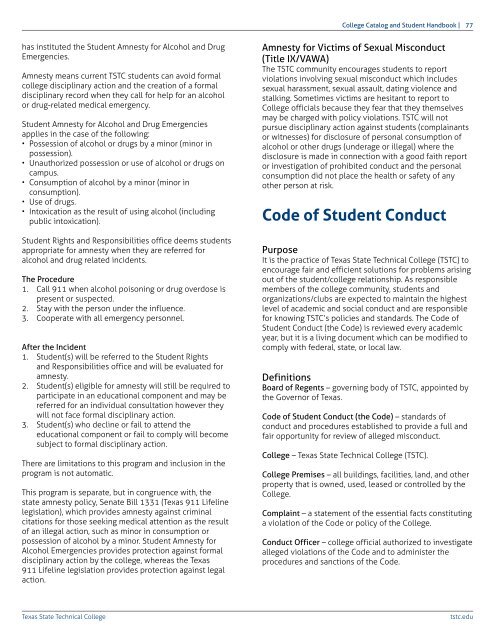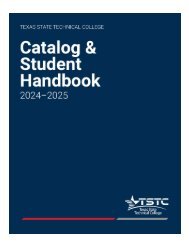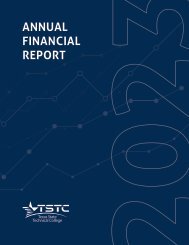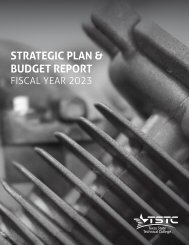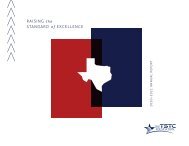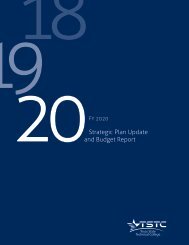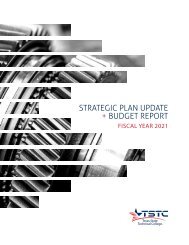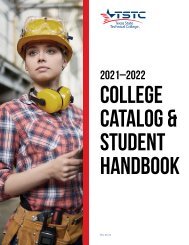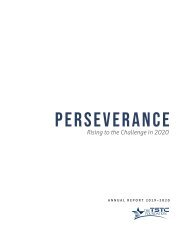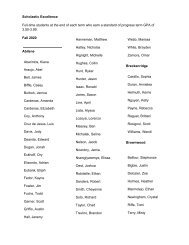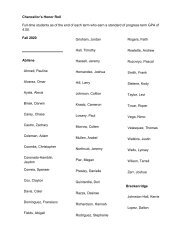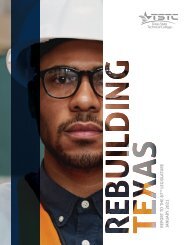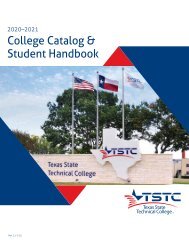Student Handbook and Catalog 2021-22 V2
Create successful ePaper yourself
Turn your PDF publications into a flip-book with our unique Google optimized e-Paper software.
College <strong>Catalog</strong> <strong>and</strong> <strong>Student</strong> <strong>H<strong>and</strong>book</strong> | 77<br />
has instituted the <strong>Student</strong> Amnesty for Alcohol <strong>and</strong> Drug<br />
Emergencies.<br />
Amnesty means current TSTC students can avoid formal<br />
college disciplinary action <strong>and</strong> the creation of a formal<br />
disciplinary record when they call for help for an alcohol<br />
or drug-related medical emergency.<br />
<strong>Student</strong> Amnesty for Alcohol <strong>and</strong> Drug Emergencies<br />
applies in the case of the following:<br />
• Possession of alcohol or drugs by a minor (minor in<br />
possession).<br />
• Unauthorized possession or use of alcohol or drugs on<br />
campus.<br />
• Consumption of alcohol by a minor (minor in<br />
consumption).<br />
• Use of drugs.<br />
• Intoxication as the result of using alcohol (including<br />
public intoxication).<br />
<strong>Student</strong> Rights <strong>and</strong> Responsibilities office deems students<br />
appropriate for amnesty when they are referred for<br />
alcohol <strong>and</strong> drug related incidents.<br />
The Procedure<br />
1. Call 911 when alcohol poisoning or drug overdose is<br />
present or suspected.<br />
2. Stay with the person under the influence.<br />
3. Cooperate with all emergency personnel.<br />
After the Incident<br />
1. <strong>Student</strong>(s) will be referred to the <strong>Student</strong> Rights<br />
<strong>and</strong> Responsibilities office <strong>and</strong> will be evaluated for<br />
amnesty.<br />
2. <strong>Student</strong>(s) eligible for amnesty will still be required to<br />
participate in an educational component <strong>and</strong> may be<br />
referred for an individual consultation however they<br />
will not face formal disciplinary action.<br />
3. <strong>Student</strong>(s) who decline or fail to attend the<br />
educational component or fail to comply will become<br />
subject to formal disciplinary action.<br />
There are limitations to this program <strong>and</strong> inclusion in the<br />
program is not automatic.<br />
This program is separate, but in congruence with, the<br />
state amnesty policy, Senate Bill 1331 (Texas 911 Lifeline<br />
legislation), which provides amnesty against criminal<br />
citations for those seeking medical attention as the result<br />
of an illegal action, such as minor in consumption or<br />
possession of alcohol by a minor. <strong>Student</strong> Amnesty for<br />
Alcohol Emergencies provides protection against formal<br />
disciplinary action by the college, whereas the Texas<br />
911 Lifeline legislation provides protection against legal<br />
action.<br />
Amnesty for Victims of Sexual Misconduct<br />
(Title IX/VAWA)<br />
The TSTC community encourages students to report<br />
violations involving sexual misconduct which includes<br />
sexual harassment, sexual assault, dating violence <strong>and</strong><br />
stalking. Sometimes victims are hesitant to report to<br />
College officials because they fear that they themselves<br />
may be charged with policy violations. TSTC will not<br />
pursue disciplinary action against students (complainants<br />
or witnesses) for disclosure of personal consumption of<br />
alcohol or other drugs (underage or illegal) where the<br />
disclosure is made in connection with a good faith report<br />
or investigation of prohibited conduct <strong>and</strong> the personal<br />
consumption did not place the health or safety of any<br />
other person at risk.<br />
Code of <strong>Student</strong> Conduct<br />
Purpose<br />
It is the practice of Texas State Technical College (TSTC) to<br />
encourage fair <strong>and</strong> efficient solutions for problems arising<br />
out of the student/college relationship. As responsible<br />
members of the college community, students <strong>and</strong><br />
organizations/clubs are expected to maintain the highest<br />
level of academic <strong>and</strong> social conduct <strong>and</strong> are responsible<br />
for knowing TSTC’s policies <strong>and</strong> st<strong>and</strong>ards. The Code of<br />
<strong>Student</strong> Conduct (the Code) is reviewed every academic<br />
year, but it is a living document which can be modified to<br />
comply with federal, state, or local law.<br />
Definitions<br />
Board of Regents – governing body of TSTC, appointed by<br />
the Governor of Texas.<br />
Code of <strong>Student</strong> Conduct (the Code) – st<strong>and</strong>ards of<br />
conduct <strong>and</strong> procedures established to provide a full <strong>and</strong><br />
fair opportunity for review of alleged misconduct.<br />
College – Texas State Technical College (TSTC).<br />
College Premises – all buildings, facilities, l<strong>and</strong>, <strong>and</strong> other<br />
property that is owned, used, leased or controlled by the<br />
College.<br />
Complaint – a statement of the essential facts constituting<br />
a violation of the Code or policy of the College.<br />
Conduct Officer – college official authorized to investigate<br />
alleged violations of the Code <strong>and</strong> to administer the<br />
procedures <strong>and</strong> sanctions of the Code.<br />
Texas State Technical College<br />
tstc.edu


